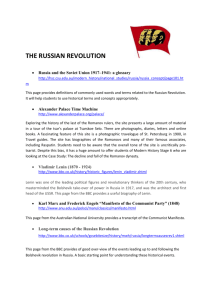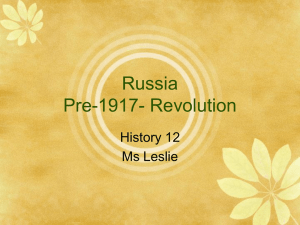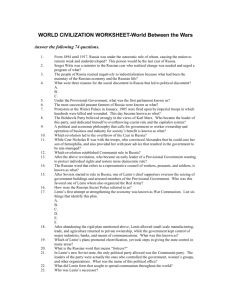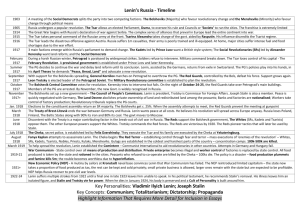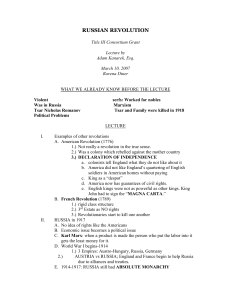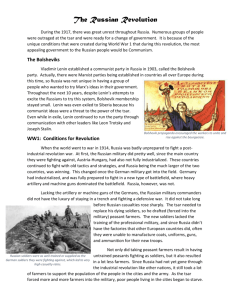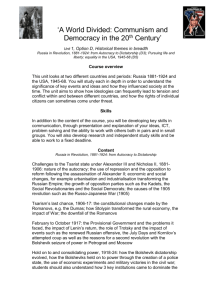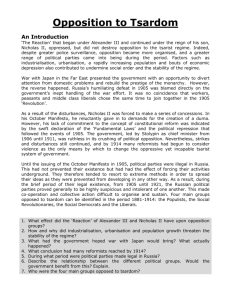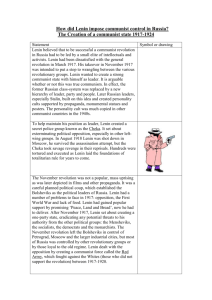Unit 2 Study Guide - International School of Toulouse, France
advertisement
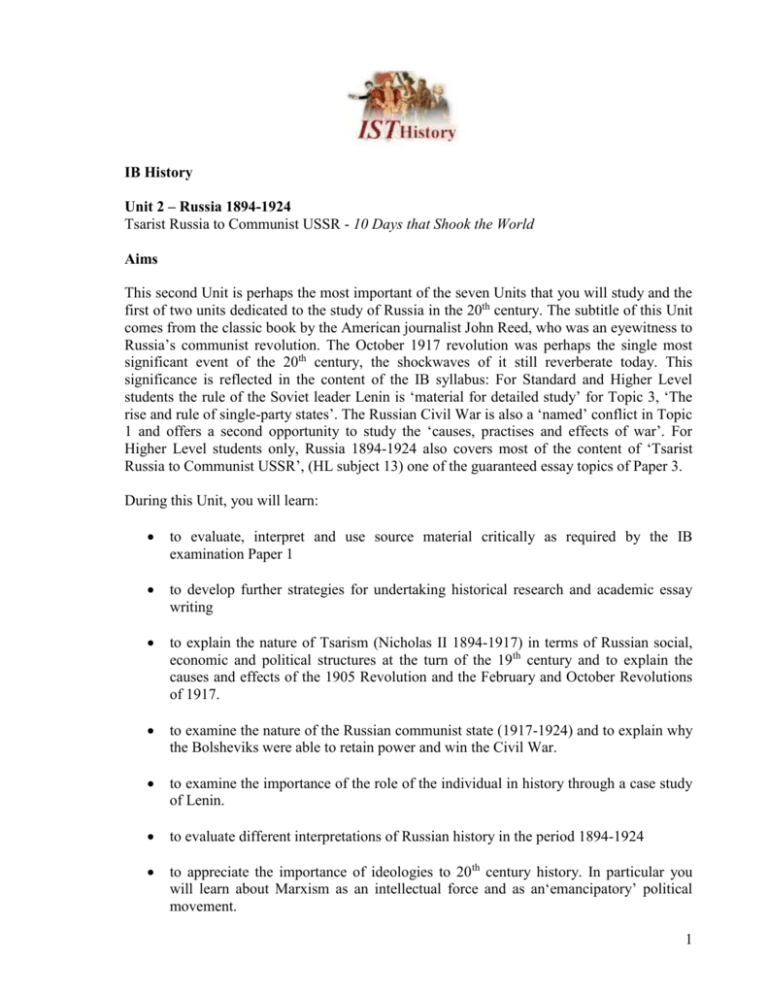
IB History Unit 2 – Russia 1894-1924 Tsarist Russia to Communist USSR - 10 Days that Shook the World Aims This second Unit is perhaps the most important of the seven Units that you will study and the first of two units dedicated to the study of Russia in the 20th century. The subtitle of this Unit comes from the classic book by the American journalist John Reed, who was an eyewitness to Russia’s communist revolution. The October 1917 revolution was perhaps the single most significant event of the 20th century, the shockwaves of it still reverberate today. This significance is reflected in the content of the IB syllabus: For Standard and Higher Level students the rule of the Soviet leader Lenin is ‘material for detailed study’ for Topic 3, ‘The rise and rule of single-party states’. The Russian Civil War is also a ‘named’ conflict in Topic 1 and offers a second opportunity to study the ‘causes, practises and effects of war’. For Higher Level students only, Russia 1894-1924 also covers most of the content of ‘Tsarist Russia to Communist USSR’, (HL subject 13) one of the guaranteed essay topics of Paper 3. During this Unit, you will learn: to evaluate, interpret and use source material critically as required by the IB examination Paper 1 to develop further strategies for undertaking historical research and academic essay writing to explain the nature of Tsarism (Nicholas II 1894-1917) in terms of Russian social, economic and political structures at the turn of the 19th century and to explain the causes and effects of the 1905 Revolution and the February and October Revolutions of 1917. to examine the nature of the Russian communist state (1917-1924) and to explain why the Bolsheviks were able to retain power and win the Civil War. to examine the importance of the role of the individual in history through a case study of Lenin. to evaluate different interpretations of Russian history in the period 1894-1924 to appreciate the importance of ideologies to 20th century history. In particular you will learn about Marxism as an intellectual force and as an‘emancipatory’ political movement. 1 Objectives At the end of this unit, you will be able to: 1. Accurately recall the significant facts of the period 1894-1924 as encountered in reading and note making on the following topics: Russia 1894-1917 (compulsory for Higher Level Students only) A chronology of 1894-1917 The Nature of Tsarist Russia under Nicholas II The growth of opposition and revolutionary groups Industrial and democratic reform: Witte, Stolypin 1905 Revolution: causes and consequences. Russia in the First World War Ideologies and Marxism Liberalism and conservatism A brief history of socialism Marxism as historical and political theory 1917: Year of Revolutions A chronology of 1917 Causes and consequences of the February and October Revolutions The Provisional Government April Thesis, June offensive, July Days Interpreting the Bolshevik revolution Lenin’s Russia 1917-1924 A chronology of 1917-24 The treaty of Brest-Litovsk Dictatorship: the rise of a single party state Causes, events and consequences of the Civil War State Capitalism, War Communism and New Economic Policy (NEP) Lenin’s role in history. 2. Read and select relevant historical information from a range of different historical sources for notes that are appropriately detailed 3. Research and produce an appropriate academic essay on any aspect of the content outlined in point 1 (above) 4. Evaluate, interpret and use source material critically as required by IB Paper 1 5. Identify the main features of Liberalism, Conservatism and Socialism. Examine Marxism as an historical and social theory and Lenin’s contribution to its evolution. 6. Evaluate the historiographical issues surrounding the Tsarist regime, the Bolshevik Revolution and its consequences and the role of Lenin as an individual in history. 2 Outcomes There will be occasional ‘spot’ factual tests during the course of the Unit You will write at least two research essays on prescribed questions You will write at least two essays in exam conditions on unseen questions You will complete a number of ‘document questions’ at home and in class and at least one Paper 1 in exam conditions. You will complete a well organised, comprehensive set of notes for inspection at the end of Unit Activity Date Grade Comments Research Essay 1 Research Essay 2 Class Essay 1 Class Essay 2 Paper 1 Paper 1 Factual Test Notes Inspection Richard Jones-Nerzic January 2005 3

